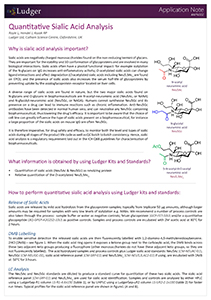Glycan Analysis Services
Quantitative Sialic Acid Analysis
Sialic acids are terminal, negatively charged monosaccharides present on many N- and O-glycans. Biopharmaceuticals often contain two main types of sialic acid; N-acetyl-neuraminic acid (Neu5Ac) and N-glycolyl-neuraminic acid (Neu5Gc). Neu5Ac is found in both human and non-human cells, whereas Neu5Gc is not present on human glycoproteins. The biopharmaceuticals efficacy, serum half-life and immunogenicity are impacted by both the abundance and the type of sialylation (including O-acetylation). Consequently, sialylation is a glycosylation critical quality attribute (GCQA).
Sialic acid analysis is a regulatory requirement (ICHQ6B) and should be performed throughout the product lifecycle to specify the following:
- Overall degree of drug sialylation – absolute quantitation of sialic acid residues per molecule
- Relative quantities of Neu5Ac:Neu5Gc
- Relative percentage of O-acetylated sialic acids
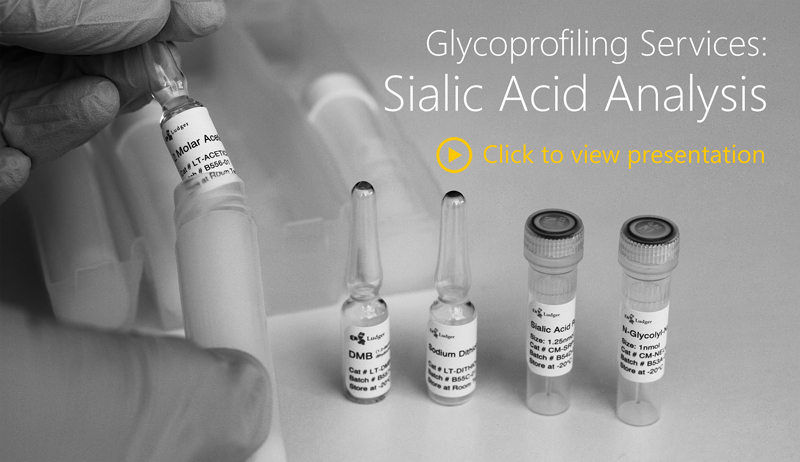
This module provides absolute amounts of Neu5Ac and Neu5Gc and relative amounts of Neu5,9Ac2. The analysis will be performed on single or triplicate releases of samples (typically 50-200 µg for each release), an equivalent amount (by volume) of sample buffer negative control, and alongside Ludger's system suitability standards, positive (including Ludger's quantitative sialylated glycopeptide standard BQ-GPEP-A2G2S2-10U) and negative controls.
This module is suitable for:
- sialylated samples
- quality control
- monitoring batch to batch consistency
- comparability studies
- research
In order to gain more information on relative proportion of the mono-, di-, tri- and tetra-sialylated glycan structures present in the samples WAX-HPLC module is required.
Sample types:
- Biopharmaceuticals: glycoprotein hormones (e.g. follicle stimulating hormone (FSH) and erythropoietin (EPO), Fc fusion proteins, monoclonal antibodies (mAbs), vaccines)
- Cells: mammalian cell lines, bacterial cell components
- Biological fluids, tissues and others
- COVID-19 patient samples (e.g. plasma, tissues)
- SARS-CoV-2 infected cell lines
Quantitative Sialic Acid Release and DMB Labelling
Sialic acids are released from glycoproteins by mild acid hydrolysis, labelled with 1,2-diamino-4,5-methylenedioxybenzene (DMB) and analysed by LudgerSep R1 HPLC with fluorescence detection.
The absolute amounts of Neu5Ac & Neu5Gc are calculated by reference to standard curves from Ludger's quantitative Neu5Ac & Neu5Gc standards. The presence of O-acetylated sialic acids is determined by comparison to a Neu5,9Ac2 standard and to a reference panel containing Neu5Ac, Neu5Gc, Neu5,7Ac2, Neu5,Gc9Ac, Neu5,9Ac2 and Neu5,7,(8),9Ac3Gc. The relative proportions of these different sialic acids are determined from the peak areas.
Report
Final report contains:
- HPLC profiles for system suitability standards and Ludger positive controls
- HPLC profiles for client samples and buffer negative controls
- Quantitation of Neu5Ac & Neu5Gc as nmoles/mg protein
- Relative quantitation of the O-acetylated sialic acids (e.g. Neu5,9Ac2)
Application Note
Relevant Posters
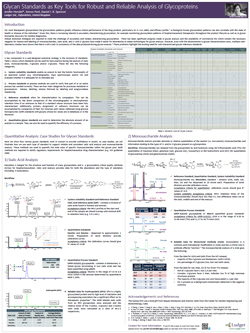
Hendel J, Peel S, Spencer D
Presented at: 29th International Carbohydrate Symposium
Lisbon, Portugal. July 15-19th 2018
Awarded the Chemical Biology Poster Prize by the Royal Society of Chemistry's 'Organic & Biomolecular Chemistry' Journal
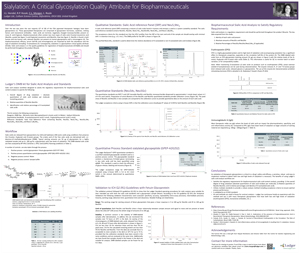
Hendel JL, Kozak RP, Morgan CL, Royle L
Presented at:WCBP 2018: 22nd Symposium on the Interface of Regulatory and Analytical Sciences for Biotechnology Health Products
Washington D.C., United States. January 30-February 1st 2018
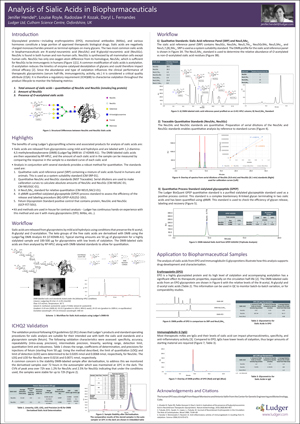
Hendel J, Royle L, Kozak RP, Fernandes DL
Presented at: WCBP 2017: 21st Symposium on the Interface of Regulatory and Analytical Sciences for Biotechnology Health Products
Washington D.C., United States. January 24-26th 2017
Keywords: RP-HPLC, EPO, Mabs, fetuin, sialic acid, critical quality attribute (CQA), quantitation, Neu5Ac, Neu5Gc, DMB

